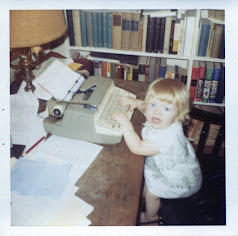If the last few years have taught us anything, it's that your name doesn't have to make it into a Wikipedia article for historical events to have a great impact on your life. The same obviously applies to our ancestors and will apply to our descendants. Anyone who has spent any amount of time on this planet, has been a witness to history.
In some cases we may have heard stories and anecdotes about those impacts, like my grandmother's choice of wedding dress in the midst of the Great Depression, or my mother's first trip to the butcher after the end of WWII rationing. Maybe they were a little bit closer to events, like my grandfather who worked at the University of Chicago in the 1940s and rode "the night train to Washington" with Enrico Fermi and others on "matters of a secret nature" during the Manhattan Project.
One of the reasons I've decided to research my paternal grandfather's maternal lines this year is to see if I really do descend, as I was told by another Ancestry member years ago, from Sir Edward Bayntun, Vice Chamberlain to Anne Boleyn, Jane Seymour, Anne of Cleaves, Katherine Howard and Catherine Parr and close friend of Catherine of Aragon. It's not the royal connection that intrigues me so much, but the history. And if there's a historical period that is well researched, it's the reign of Henry VIII.
If Ancestry hadn't shown me my 2nd great-grandfather's bounty application, I likely would never have heard of the Fenian Raids, much less understood the anxiety they provoked in many people living close to the border, possibly including my ancestors. If I hadn't read some of the horrifying details of the Great Famine, I never would have understood the lives, the trauma and even the bequests of some of Donald's immigrant Irish ancestors.
The grinding poverty that pushed my great-grandfather Anderson to come to America was certainly the result of his father's death, but did Sweden's last famine, in the year that he was born, also have an impact? I may never know, but learning about it may still give me some context for the lives of his family.
I've become quite passionate about digging into the history that my ancestors lived through, the events that shaped them, perhaps even fascinated them as well. I've been keeping my public library busy, my bookshelves full and my podcast queue is never-ending. And just like I'll never run out of ancestors to research, I'll never finish placing them in history.





